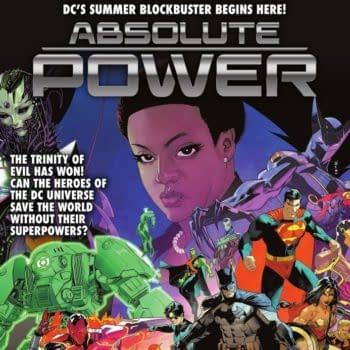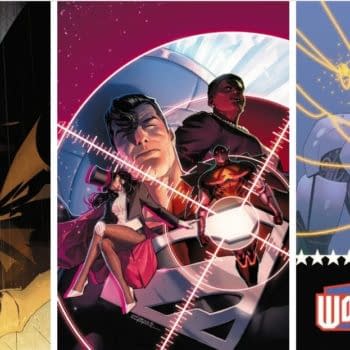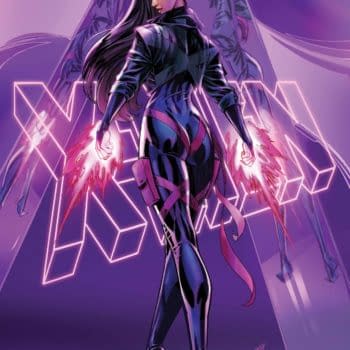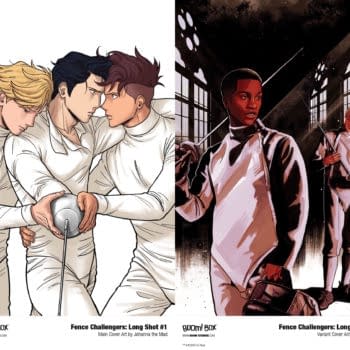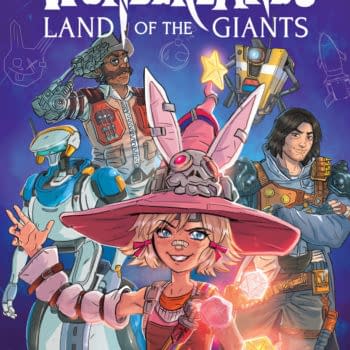Posted in: Comics | Tagged: Comics, conservative, liberal
How Conservatism May Be Hurting Comic Book Sales
Yesterday, comic creator and reader Darin Wagner wrote a piece for Bleeding Cool entitled How Liberalism May Be Hurting Comic Book Sales. I thought it was an interesting point of view, but not one I agreed with. I'm generally a bit of a lefty/liberal, but find certain aspects of my ideology tap into those associated with the conservative/right. Because I'm an individual, and not a plotted point on a graph.
How do you define conservatism anyway? There are some general principles, smaller government, self reliance over state intervention, sure but also a move away from radical policy change, a belief that things have been fine in the past, change can be dangerous, and movement by incremental steps is far more preferable. Of course there are many who identify as Conservative who would not fit this pattern at all.
But as as a genre, the superhero is very conservative indeed. Though this can be interpreted in different ways. They stop bank robbers or other super villains dressed in a similar fashion, they don't try to alter the causes, create a world where people don't want to be bank robbers or super villains. Proponents of law and order, but not part of big government, they emphasise individual responsibility over statism, in keeping the world as it is, simply dealing with the side effects of that. In a universe where the Fantastic Four can create portals into other dimensions, robots and all manner of otherworldy devices to beat the bad guys, they don't eliminate poverty, they don't create free, environmentally friendly energy. Any attempt by someone to do such a thing, and solve real world problems such as people losing limbs, has their laudable aim backfire on them and they become a super villain like the Lizard. But why?
Stan Lee famously defined the art of superhero comics as "the illusion of change". Making the readers feel that everything is fresh and new, while in reality, it churns through the same, comfortable plots time and time again. Real change, when it occurs, is incremental and takes time. There are now more black characters, more gay characters than there used to be, plots have become more complex, the thought bubble has all but disappeared, but comics lagged behind the rest of pop culture in that respect. Lurches forward, such as Milestone were kept isolated, eventually trickling through to mainstream comics culture.
The problem can be seen in the changing audience. We're all older now. Rather tan reading comics for a few years and them moving on, we stayed reading comic books. More importantly we stayed reading superhero comic books and as a result encouraged incremental changes to the content – and price, pushing them outside of a child's interest or budget. But at the heart, superhero comics hadn't changed, and the new audience started to see the joins. And recognised the plots on the fifth, sixth, seventh time around. Just as the kids went away, so did the adults. The comics just couldn't change quickly enough to reflect the demands of the audience.
Also, there were corporate concerns. Because even if the comics sales had faded away, merchandise and movie adaptations increased, mostly appealing to people who had read comics as children, or see the cartoons – but didn't any more. Making big changes to characters could, potentially, damage their cross marketing.
The illusion of change stepped up a notch to cope. Characters died forever – only to be revived a few issues later. Costumes changes, identities changed, only for the wheel to revolve once more and everyone take their original places. Electric blue Supermen, Spider-Armour, Aquaman bearded and disabled, so much sound and fury that ultimately changed nothing. And eventually audiences have tired, without new readers to replace them. It is the inherent unchanging conservative nature of the corporate superhero comic that has seen them lose sales.
As for the politics, Darin Wagner is really arguing that any injection of politics, liberal or conservative, divides an audience and thereby reduces it. I disagree entirely. The best selling superhero comic books of recent decades have often been highly political, often quite radical, they've just so happened to have multiple points of view in them. But rather than injecting the conservative superhero with a liberal friendly oil rigging disaster as Darin Wagner mentions, they satirise the very conservative nature of the superhero. And then show real change.
Take Watchmen. One of the best selling superhero comics, with millions of copies in print. Ozymandias is the ultimate interventionist liberal, taken to the monstrous degree. He creates a peace, a fake peace, a forced peace on the bodies of millions. But Rorschach is the objectivist, his horror is that he would happily destroy his fake peace, and see the potential deaths of billions, rather than compromise his ideals. The audience can make their own choice between them, both are horrific, but both also have an appeal.
Frank Miller's Dark Knight Returns gave you a Batman and a Superman taking different political points of view, espoused personal responsibility while also sending up Reagan. It gave people with different political beliefs a side to root for, and got far better reviews than, say, Holy Terror, a work of polemic without even an attempt to understand the other person's position. Dark Knight Returns remains a string seller.
And what is written as satire is often taken as the real deal, giving the publisher two polemic audience each believing they are in agreement with the comic they are reading. Law And Order freaks love Judge Dredd's unimpeachable delivery of harsh justice, while Amnesty International activists wet themselves over the comic's hilarious portrayal of an abusive police state.
Warren Ellis's The Authority, is a radical assault on those who power by self-believed divine right, the neoconservative movment ripped a new one even before its finest moments, to the extent that when 9/11 happened, it was compared to many fans I knew to reading The Authority. But most of the audience seemed happy to read that book without the omnipresent satire.
Mark Millar injected a more obvious political treatment into Marvel's Civil War, and increased sales on all sorts of books, to ludicrous degrees in some cases, that far outstrips modern sales. He set all the Marvel superheroes against each other in a battle between Freedom and Security, or Anarchy and Fascism, whatever you like. And everyone took a side… and found their own political ideals reflected in the side they took. One of the most political books Marvel has ever published, even if the positions taken are very cartoonish, and that actually seemed to reflect real change rather than the illusion of change, even to a jaded audience – and sales rocketed. There hasn't been a followup to match it from Marvel and sales have reflected that. But then none of those followups were quite as political as Civil War.
Conservative comics, those that try and preserve what went before are often considered boring. "Dad comics" Both DC and Marvel Comics encountered a spiral of decreasing sales the past few years, lurching from event to crossover, each time hoping to bottle a little of what came before, each time receiving decreasing returns. Because there was rarely real change, there is too much invested in corporate characters to risk that. People could see through the illusion of change now. And then the DC Relaunch happened, the very definition of the successful illusion of change. And this time it was accepted, people bought into the comics, the market was lifted, even Marvel's sales began to rise on the back of it. The comics haven't really changed, Superman is not a go go dancer in Las Vegas, Batman is not a stay-at-home single mum. But so far, that's okay.
Can they keep the plates spinning, or will people realise that things haven't really changed, and the slow decline will set in again, albeit from a higher plateau?
Darin believes that liberal writers have turned his superheroes away from an apolitical path. If there's any truth in that, I think they balance the inherent conservatism in the form. But generally, whatever a superhero writer's political position, above all, they are trying to tell an interesting and relevant story.And will take whatever path leads them there. As much as they are allowed to – business matters come first. And hey, isn't that a conservative value too?







